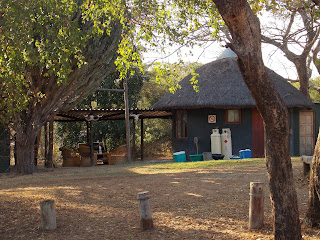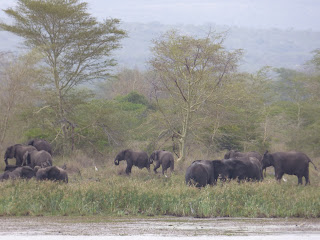Volunteering with Wildlife ACT - am I too old?
By way of explanation, here is a run
down/some answers related to the group I’ve been asked to write this piece for:
Here is why it was formed (quote from the founder):
“Simon and I were working in the field as wildlife monitors,
monitoring wild dog and black rhino respectively. We realised that there was a
need within the provincial parks of KwaZulu-Natal to have dedicated wildlife
monitors assisting the conservation managers with the daily monitoring of their
endangered priority species. All too often researchers had to be relied upon to
collect this valuable information, yet not always being able to provide managers
with what they were looking for. So, we developed self-funded Management
Orientated Monitoring Systems for these parks, with the conservation managers
in mind.”
He also points out that “As the population continues to grow
and the economy in most of Africa weakens, our protected areas are becoming
extremely fragile. Conservation priorities continue to be pushed aside, and
what is left of government funding and drive is being utilised elsewhere. Other
means of funding and support is therefore of huge importance to save these wild
places and our endangered species.” Which answers the question as to why
volunteers are needed.
The full interview can be found here: https://www.goabroad.com/interviews/chris-kelly-director
Health
Volunteers are warned that they will be working in remote
areas and that anything other than basic health care is not available, but
volunteers are screened on application and anyone not suitable for health
reasons won’t be eligible. You are asked about any dietary requirements which will
be catered for.
You actually don’t need any vaccinations for South Africa.
Some people choose to take medication to prevent malaria. I’ve never bothered.
Just industrial strength bug spray and a mozzie net. The biggest risk is tick
bite fever, but the bug spray and sensible clothes guard against that.
You do need to be fit enough to get onto and off the back of a Toyota Land Cruiser and to be able to sit on a backless bench, over rough tracks for several hours. However is may be possible to sit in the cab if you can't manage it.
Accommodation
Volunteers do share accommodation and we do our own cooking.
It's basic but comfortable - but no aircon. Only fans.
Some reserves have washing machines, some have a Joyce who also does all the
cleaning. The person who does all the bookings tries not to put older
volunteers with a load of 20-somethings, but it isn’t always possible. At least
everyone is there for the same reason, so have at least one thing in common and
the maximum number on any one placement is 5. Most of the accommodation is
unfenced, so you can be sharing your space with some interesting neighbours.
Safety
Professional monitors are in charge at all times. No-one is
ever left to their own devices.
Volunteers go for anything from 2 weeks up. You don’t stay
in the same place, so if you’re there for more than 2 weeks you get a broader
view of what the organisation is doing in different reserves. You can opt to
work with a particular species, but you don’t work with it exclusively: it’s
simply the top priority.
Work for the community
All but one of the projects is based in a commercial reserve*,
so ensuring that the animals are safe provides work for the local people who
are the guides, man the gates, go on poacher patrol, maintain the parks and
administer them. Visitors go to see the wildlife and if that’s not there, then
the jobs go.
All the staff are South African.
What good does it do?
*There were two but the Botswana internship initiative has
been closed down. I don’t know why. The other, which is currently happening, is
a whale monitoring project. The migrating whale population in The Indian Ocean
hasn’t been monitored for a very long time and this initiative will provide
valuable information about whale numbers and species.
The work happens 365 days a year other than one week-end
when all the reserve staff and those who do the admin get together for a
week-end in St Lucia. Volunteers also go to St Lucia for that week-end. This is
the only time when there isn’t someone on duty so the work is ongoing.
Other than twice daily drives**, starting before dawn, volunteers
set up, monitor and classify camera trap footage – identifying specific animals
where necessary (every animal on the priority list is photographed from both
sides or their ear notches are noted for rhino) and upload the information onto
a central database. This is then shared with the relevant organisation so that
a big picture of what is happening can be formed and any necessary action
taken. It isn’t all about decreasing numbers. uMkhuze’s elephant population is
so successful that a number have had to be relocated to prevent damage to the
environment. But without the input from the volunteers, no-one would have known
that and permanent damage to the reserve and the elephants could have occurred.
**I actually stopped doing the morning drives when I was
last there. A 3am start was beyond me after the first week. The start in winter is later and I find it
more manageable. (I am 70.)
We can also be involved in darting animals to fit/refit
tracking collars, releasing animals from snares and ensuring that they are
treated, monitoring animals in the boma (a large enclosure) where they are kept
either prior to release following relocation or recovering from a human inflicted
injury.
If you want me to clarify or have any other queries, please ask.




Comments
Post a Comment